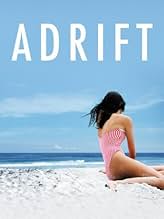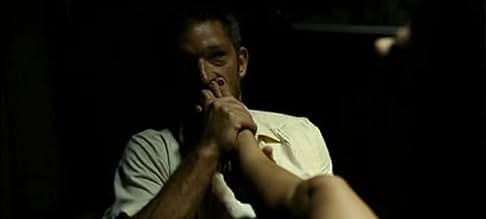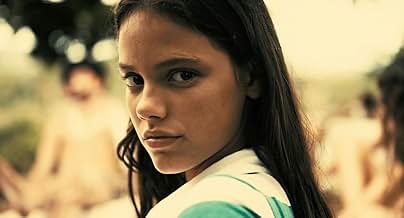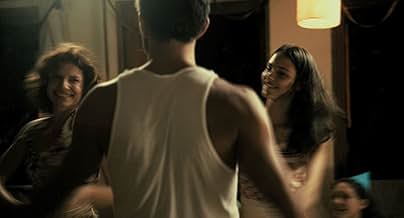IMDb RATING
6.7/10
3.1K
YOUR RATING
A 1980s-set drama about a teenage girl undergoing her sexual awakening when she learns about her father's infidelities.A 1980s-set drama about a teenage girl undergoing her sexual awakening when she learns about her father's infidelities.A 1980s-set drama about a teenage girl undergoing her sexual awakening when she learns about her father's infidelities.
- Awards
- 8 wins & 24 nominations total
- Director
- Writers
- All cast & crew
- Production, box office & more at IMDbPro
Featured reviews
The Sao Paulo writer Mathias (Vincent Cassel) and his wife Clarice (Débora Bloch) are at their beach house in the coastal town of Buzios for the summer. They spend their days living a bohemian life with their friends, their three children and the rest of the young rat-pack from the beach. Their beautiful eldest daughter Filipa (Laura Neiva) is coming of age, although sitting on her fathers lap she is slowly but surely discovering her femininity. However the spring time of her youth sees not only the pitfalls of young love, but also a growing rift between her parents, and the threat of a disintegrating home.
A Deriva is a pleasure to watch, despite a simple storyline. It hinges on the relationship between Mathias and his daughter Filipa, as the film's warm focal point of the fragmenting family. Their roles are well worked out in these trying times. Mathias, and his wife Clarise, wisely protect their children from exposure of their marital rifts, but naturally the children - and specifically the eldest- feel the overshadowing conjugal burst.
What is perhaps the most remarkable, is how the same story filmed through the eyes of another culture, would have been so different. There are two elements at play here: a romanticized Brazil and the time frame. By placing the story in Brazil, we are taken into a joyful carefree Latin world of beaches, beautiful people, love and dance. By placing the story in the 1980s, were see a reality as if it was recalled by a much older Filipa looking back. It is a reality without a technology-inspired stress and superficiality, with a seeming authenticity of life orientated around physical people, living in homes filled with curiosity relics, without made-in-China goods and television-mimicking sentiments. It is a vision which justifies a perhaps kinder look at reality.
For everyone who is wondering how French top actor Vincent Cassel found himself in a small Brazilian production – Cassel is a frequent visitor of Bahia, the African-influenced state in the tropical north. He speaks Portuguese fluently, but as all attentive viewers will notice, it is not his (slightly off) accent which puts him in a curious position in the film – his role does not get lines as credible as those which the other characters get. Mathias' character, and hence the film, is saved by Cassel's acting talent. But then the movie was destined to float or sink on Cassel and Laura Neiva's capacity to convey the sensual lightness of living anyway. And that, they pull of masterfully.
A Deriva is a pleasure to watch, despite a simple storyline. It hinges on the relationship between Mathias and his daughter Filipa, as the film's warm focal point of the fragmenting family. Their roles are well worked out in these trying times. Mathias, and his wife Clarise, wisely protect their children from exposure of their marital rifts, but naturally the children - and specifically the eldest- feel the overshadowing conjugal burst.
What is perhaps the most remarkable, is how the same story filmed through the eyes of another culture, would have been so different. There are two elements at play here: a romanticized Brazil and the time frame. By placing the story in Brazil, we are taken into a joyful carefree Latin world of beaches, beautiful people, love and dance. By placing the story in the 1980s, were see a reality as if it was recalled by a much older Filipa looking back. It is a reality without a technology-inspired stress and superficiality, with a seeming authenticity of life orientated around physical people, living in homes filled with curiosity relics, without made-in-China goods and television-mimicking sentiments. It is a vision which justifies a perhaps kinder look at reality.
For everyone who is wondering how French top actor Vincent Cassel found himself in a small Brazilian production – Cassel is a frequent visitor of Bahia, the African-influenced state in the tropical north. He speaks Portuguese fluently, but as all attentive viewers will notice, it is not his (slightly off) accent which puts him in a curious position in the film – his role does not get lines as credible as those which the other characters get. Mathias' character, and hence the film, is saved by Cassel's acting talent. But then the movie was destined to float or sink on Cassel and Laura Neiva's capacity to convey the sensual lightness of living anyway. And that, they pull of masterfully.
A very beautiful story, executed perfectly. The beach, the landscape evrything was so beautiful.
The actors were good too.
In The movie, the daughter(Filipa) handled the situation like a boss. And Camilla Belle was a good supporting role.
Overall a very good movie. I recommend watching it.
The actors were good too.
In The movie, the daughter(Filipa) handled the situation like a boss. And Camilla Belle was a good supporting role.
Overall a very good movie. I recommend watching it.
This is a coming of age story. Filipa is fourteen years old and dealing with the usual issues of a teen: sexuality, social acceptance, and self identity.
At the same time, her parents' relationship is crumbling under the weight of a real crisis.
All children confront the reality of their parents' imperfection at some point. Up till now, Filipa has seen her mother and (especially) her father through the eyes of an adoring child. She has to dispense with the childish viewpoint and confront reality, as she perceives it, just as the family's foundation is threatened. She feels her world crumbling around her as she realizes that she never really understood the real foundation of the family. In the end, she is adrift without any direction or understanding.
The resolution of this story is an imperfect one, with all involved parties grasping for the little pieces of happiness that can be salvaged. It is a realistic ending to a real-world story.
This story is about love, in all its forms--familial, romantic, platonic. It is love that sets them all adrift and love that provides whatever solace can be found.
At the same time, her parents' relationship is crumbling under the weight of a real crisis.
All children confront the reality of their parents' imperfection at some point. Up till now, Filipa has seen her mother and (especially) her father through the eyes of an adoring child. She has to dispense with the childish viewpoint and confront reality, as she perceives it, just as the family's foundation is threatened. She feels her world crumbling around her as she realizes that she never really understood the real foundation of the family. In the end, she is adrift without any direction or understanding.
The resolution of this story is an imperfect one, with all involved parties grasping for the little pieces of happiness that can be salvaged. It is a realistic ending to a real-world story.
This story is about love, in all its forms--familial, romantic, platonic. It is love that sets them all adrift and love that provides whatever solace can be found.
Adrift, aka A Deriva, as a story about a 15 year old facing what must have seemed an impossible situation, if the story was real life. The problem is faced well, sort of. It is an optimistic story. It is okay as a message story but okay too if one ignores the message and watches only for entertainment.
The Cake Eaters (2007) has elements that resemble this story and it is also optimistic, even though the main theme unfurls alongside the story of a butcher and a cow. It does not seem to be a story that can be either a message or entertainment, but it is.
I find this to be an interesting story that is worth trying to comment on, just my first attempt was deleted after a complaint to the administrator after it had been up for nine months. It did try to be an honest and reasonable comment and I really had not thought that it included any offensive stuff. What I did was include comment about my own reality in the days around me first watching A Deriva. Adrift is a fictional story and my own reality can feel very fictional too. Not that other IMDb browsers will have a personal reality that feels fictional. I consider this attempt at a comment to be weak compared to the first version, it misses out personal aspects.
Many of the characters in Adrift are attractive, scantily clad, early teens girls. That can be read as relating to this story being set on the Brazil coast, a holiday resort town, for the kids this is their summer holidays. If one wants to look for meaning and symbolism in the dress code then there is a mountain of plus and minus waiting to be found, but the simplest view is that this is just 'summer holidays' in the southern tropics. It might even be a tropical equivalent to winter.
The adults, be they parents or young adults, have a role that blends well with the story of the early teens. If one prefers, some of that can easily be the central aspect, instead. One can look to this story for a wide range of sub-stories and all have a relevance. I found how the parents deal with their kids to be central, for me.
I find the dead dog to be difficult to interpret re symbolic meaning, for me it is just a dead dog.
*
At September 2015 I have just re-watched it, straight after watching the ultra low budget 'Some Prefer Cake' of 1998, a story that loses more than most from the low budget constraints, particularly with the acting. That totally draws out the quality of this, this is so solid on so many different levels.
The Cake Eaters (2007) has elements that resemble this story and it is also optimistic, even though the main theme unfurls alongside the story of a butcher and a cow. It does not seem to be a story that can be either a message or entertainment, but it is.
I find this to be an interesting story that is worth trying to comment on, just my first attempt was deleted after a complaint to the administrator after it had been up for nine months. It did try to be an honest and reasonable comment and I really had not thought that it included any offensive stuff. What I did was include comment about my own reality in the days around me first watching A Deriva. Adrift is a fictional story and my own reality can feel very fictional too. Not that other IMDb browsers will have a personal reality that feels fictional. I consider this attempt at a comment to be weak compared to the first version, it misses out personal aspects.
Many of the characters in Adrift are attractive, scantily clad, early teens girls. That can be read as relating to this story being set on the Brazil coast, a holiday resort town, for the kids this is their summer holidays. If one wants to look for meaning and symbolism in the dress code then there is a mountain of plus and minus waiting to be found, but the simplest view is that this is just 'summer holidays' in the southern tropics. It might even be a tropical equivalent to winter.
The adults, be they parents or young adults, have a role that blends well with the story of the early teens. If one prefers, some of that can easily be the central aspect, instead. One can look to this story for a wide range of sub-stories and all have a relevance. I found how the parents deal with their kids to be central, for me.
I find the dead dog to be difficult to interpret re symbolic meaning, for me it is just a dead dog.
*
At September 2015 I have just re-watched it, straight after watching the ultra low budget 'Some Prefer Cake' of 1998, a story that loses more than most from the low budget constraints, particularly with the acting. That totally draws out the quality of this, this is so solid on so many different levels.
In the 80's, the fourteen year-old Filipa (Laura Neiva) is spending vacations in Búzios with her father, the French writer Mathias (Vincent Cassel), her alcoholic mother Clarice (Débora Bloch) and her two younger siblings in their beach house. When Filipa feels that the relationship of her parents is deteriorating, she snoops in her father's office and finds pictures of Mathias with his American lover Ângela (Camilla Belle) hidden in a drawer of his desk. When Mathias and Clarice announce to their children that they are not going to live together for a period, the confused Filipa believes that Ângela is the responsible for the separation of her parents and discovers that the marriage of Mathias and Clarice is built of lies.
"À Deriva" is the story of Filipa, who is very close to her father in an evident Oedipus Complex, in a moment when her family is falling apart and she feels completely lost in coming of age. The story is very realistic and well acted, and it is impressive how Vincent Cassel, who loves Brazil, speaks a fluent Portuguese. The participation of Camilla Belle, who also speaks a fluent Portuguese, is limited to a few scenes and lines. Unfortunately the subplots are silly and the running time of 97 minutes is excessive for the short drama. Further, the beautiful music score is too repetitive and boring in the end and sometimes so loud that is hard to understand the dialogs. My vote is six.
Title (Brazil): "À Deriva" ("Adrift")
"À Deriva" is the story of Filipa, who is very close to her father in an evident Oedipus Complex, in a moment when her family is falling apart and she feels completely lost in coming of age. The story is very realistic and well acted, and it is impressive how Vincent Cassel, who loves Brazil, speaks a fluent Portuguese. The participation of Camilla Belle, who also speaks a fluent Portuguese, is limited to a few scenes and lines. Unfortunately the subplots are silly and the running time of 97 minutes is excessive for the short drama. Further, the beautiful music score is too repetitive and boring in the end and sometimes so loud that is hard to understand the dialogs. My vote is six.
Title (Brazil): "À Deriva" ("Adrift")
Did you know
- TriviaVincent Cassel speaks Portuguese fluently. He's a big fan of Brazilian culture and after this first experience working on a Brazilian film, he returned to make three more movies.
- SoundtracksBe My Baby
Written by Jeff Barry, Ellie Greenwich, Phil Spector
Performed by The Ronettes
Courtesy of Phil Spector International, Inc.
Produced by Phil Spector
- How long is Adrift?Powered by Alexa
Details
Box office
- Gross worldwide
- $474,422
- Runtime1 hour 37 minutes
- Color
- Sound mix
- Aspect ratio
- 1.85 : 1
Contribute to this page
Suggest an edit or add missing content



























